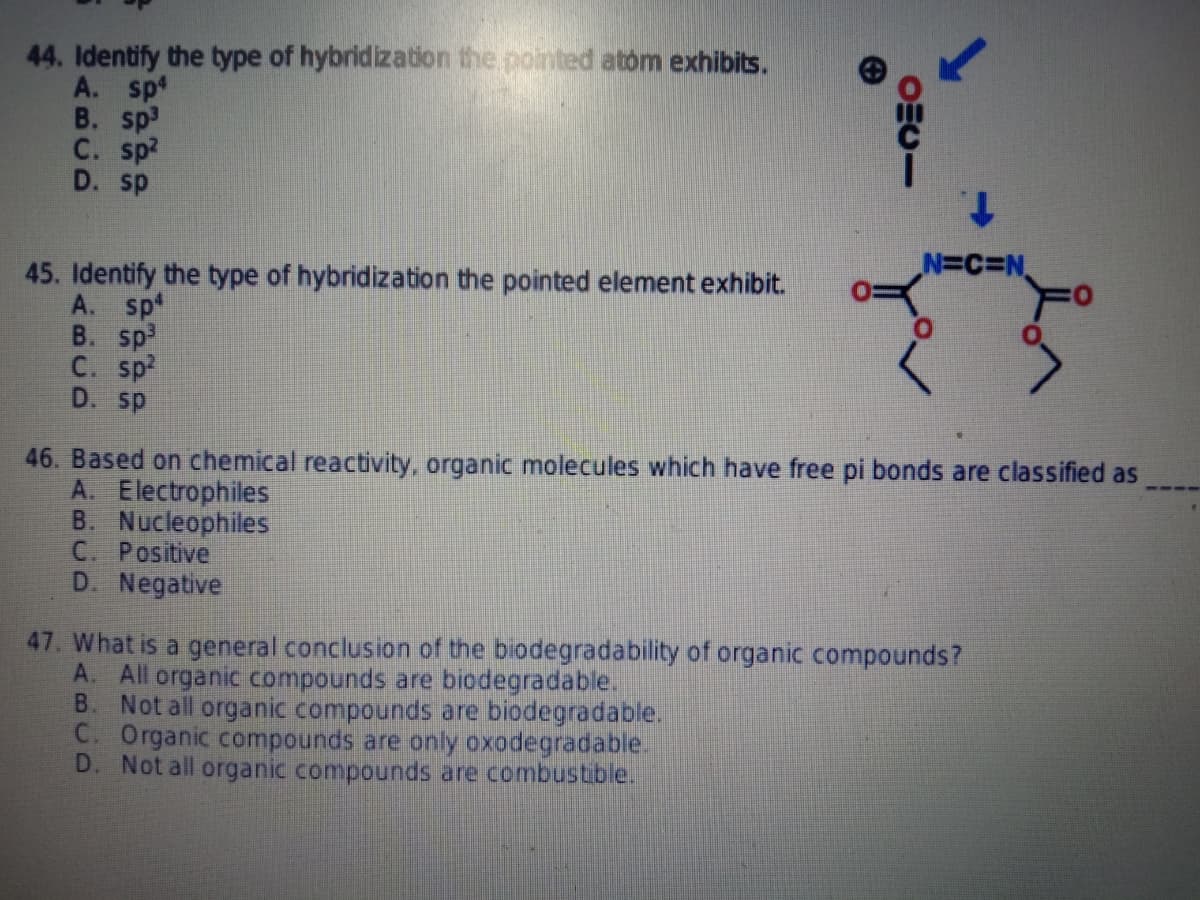46. Based on chemical reactivity, organic molecules which have free pi bonds are classified as A. Electrophiles B. Nucleophiles C. Positive D. Negative 47. What is a general conclusion of the biodegradability of organic compounds? A. All organic compounds are biodegradable. B. Not all organic compounds are biodegradable. C. Organic compounds are only oxodegradable. D. Not all organic compounds are combustible.
46. Based on chemical reactivity, organic molecules which have free pi bonds are classified as A. Electrophiles B. Nucleophiles C. Positive D. Negative 47. What is a general conclusion of the biodegradability of organic compounds? A. All organic compounds are biodegradable. B. Not all organic compounds are biodegradable. C. Organic compounds are only oxodegradable. D. Not all organic compounds are combustible.
Chapter9: Covalent Bonding: Orbitals
Section: Chapter Questions
Problem 11Q: Why are d orbitals sometimes used to form hybrid orbitals? Which period of elements does not used...
Related questions
Question
Answer only no. 46-47

Transcribed Image Text:44. Identify the type of hybridization the pointed atóm exhibits.
A. sp
B. sp3
C. sp?
D. sp
N=C=N
45. Identify the type of hybridization the pointed element exhibit.
A. sp
B. sp3
C. sp?
D. sp
46. Based on chemical reactivity, organic molecules which have free pi bonds are classified as
A. Electrophiles
B. Nucleophiles
C. Positive
D. Negative
47. What is a general conclusion of the biodegradability of organic compounds?
A. All organic compounds are biodegradable.
B. Not all organic compounds are biodegradable.
C. Organic compounds are only oxodegradable.
D. Not all organic compounds are combustible.
Expert Solution
This question has been solved!
Explore an expertly crafted, step-by-step solution for a thorough understanding of key concepts.
Step by step
Solved in 2 steps with 2 images

Knowledge Booster
Learn more about
Need a deep-dive on the concept behind this application? Look no further. Learn more about this topic, chemistry and related others by exploring similar questions and additional content below.Recommended textbooks for you


Chemistry: An Atoms First Approach
Chemistry
ISBN:
9781305079243
Author:
Steven S. Zumdahl, Susan A. Zumdahl
Publisher:
Cengage Learning

Chemistry
Chemistry
ISBN:
9781305957404
Author:
Steven S. Zumdahl, Susan A. Zumdahl, Donald J. DeCoste
Publisher:
Cengage Learning


Chemistry: An Atoms First Approach
Chemistry
ISBN:
9781305079243
Author:
Steven S. Zumdahl, Susan A. Zumdahl
Publisher:
Cengage Learning

Chemistry
Chemistry
ISBN:
9781305957404
Author:
Steven S. Zumdahl, Susan A. Zumdahl, Donald J. DeCoste
Publisher:
Cengage Learning

Chemistry: The Molecular Science
Chemistry
ISBN:
9781285199047
Author:
John W. Moore, Conrad L. Stanitski
Publisher:
Cengage Learning

Organic Chemistry: A Guided Inquiry
Chemistry
ISBN:
9780618974122
Author:
Andrei Straumanis
Publisher:
Cengage Learning

Chemistry & Chemical Reactivity
Chemistry
ISBN:
9781337399074
Author:
John C. Kotz, Paul M. Treichel, John Townsend, David Treichel
Publisher:
Cengage Learning